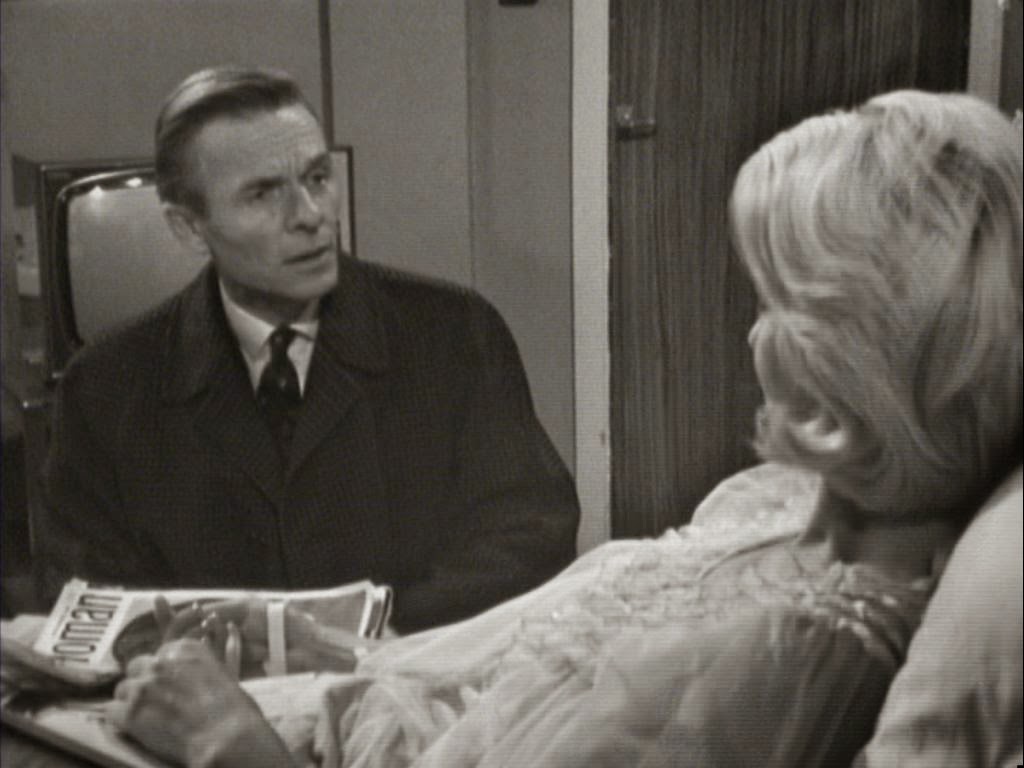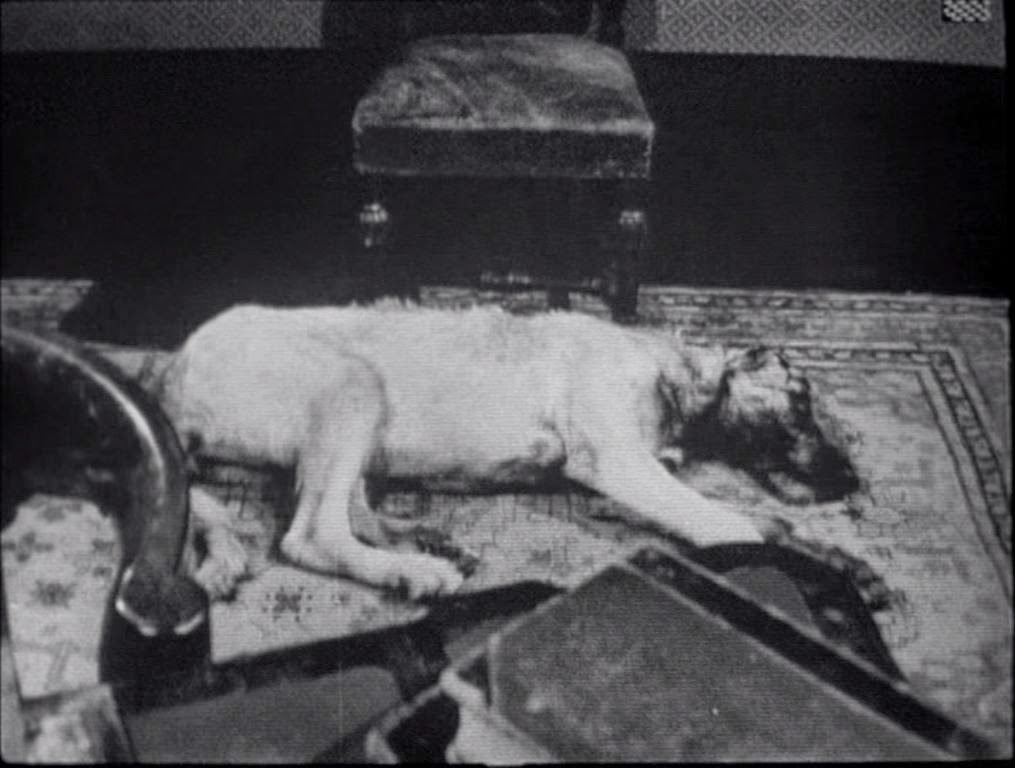Tonight's show begins (even before the show's title and whirring intro music) with Leon Dorsey telling us exactly what's wrong with him: he's got Meniere's disease. His obstinacy in discussing the matter leads to a classic "explaining to the audience something the character already knows" ruse as Alec Grant barks: "I see I shall have to talk to you like a first year medical student!" and proceeds to explain for the benefit of layviewers what Meniere's disease is. It's a disease of the inner ear which has been causing Dorsey's unbearable tinnitus and frequent collapses. Grant insists it must be operated on right away, but Dorsey refuses: the treatment would make him permanently deaf in one ear, and it could take years for him to recover his balance afterwards. Despite Grant's dire warnings of the consequences if he faints during an operation again he'd prefer to just soldier on.
Elsewhere in the hospital, Les Large is still consumed with worry over his car accident and lack of insurance. Things are looking even worse as Potter the porter (Douglas Ives) announces that there's a policeman to see him.
Michaela's still fretting about her part in Les's failure to renew his insurance. One reasonably bright spot in the gloom is provided by Guy Marshall, who reveals that Lena Hyde's collapse was due to a penicillin allergy rather than a result of the crash.
Grant calls Mr Barrett (Geoffrey Russell), the hospital secretary, to try and have something done about Dorsey. Barrett proves utterly useless and gets the phone slammed down on him as a result.
Guy asks Rex Lane-Russell to go for a drink with him, but Rex is off on his dinner date with Louise Mahler. Guy admires Rex's ability to dally with women without getting fully involved: he's currently waiting for Barbara Dodge to get back from America so the matter of her extravagant gift to the hospital can be resolved.
Les and Michaela go for dinner, ordering a very 60s menu of entrecote steaks, "croquet" potatoes, petit pois, a grapefruit juice and a grapefruit cocktail. The wallpaper matches the cuisine. Unable to concentrate on anything other than his worries, Les resolves to visit Lena Hyde the following day.
Thanks to the largesse of her employer Gerald Frobisher (who, topically, is contesting South Oxbridge in the coming general election), Lena's living the life of Riley in her private ward, with vases of chrysanthemums, stacks of magazines and enormous baskets of fruit galore. Frobisher even has a telly wheeled in for her.
Les sheepishly enters Lena's luxurious domain, and apologises for the accident. Initially hostile, Lena repeats that she can't remember any of the details of the accident. However, she soon starts to warm to Les, offering him a chocolate and showing off about her job. Les is rapidly smitten.
There's nothing as fancy as Lena's posh chocs on offer in Sister Ransome's office, just plain old tea and biscuits. But look at that tin! Incredible. The Sister and Guy are having a quick cuppa before looking at a pair of new arrivals on the ward: a boy and his father who've been admitted after their experiment in DIY fireworks went horribly wrong.
Young Billy Cartwright (Martin Norton) lost two fingers in the accident, but seems remarkably chipper about the whole thing, explaining that he found the instructions on making the bangers in an old book from 1880.
Billy's father (Bryan Mosley, Coronation Street's Alf Roberts) has suffered facial burns. He's a rather shifty character, curiously keen that nobody should know he and Billy are in the hospital.
In Lena's room, the garrulous Potter is busy tuning her TV in for her, though she's not enormously interested in it. She's even less interested in Potter's endless stream of conversation, though for my purposes his thoughts on TV are pretty interesting: he wonders whether colour TV will come in any time soon, his sister now refusing to see anything other than colour films at the cinema, and asks Lena whether she often "looks in" ("looker-in" was an early term for a watcher of television, before "viewer" became universal - thanks to Joe Moran's engrossing Armchair Nation for that one - and the basis for the name of Look-In, the junior TV Times).
Potter's musings are cut shot by the arrival of the flashy Gerald Frobisher (Basil Henson) - he wears a cape! - who's keen on suing Les for every penny "they" can get for the damage to Lena's hand. She's not so keen, but he might be able to talk her round - it looks like their relationship is more than just a professional one.
It's teatime for the patients, with bread and butter and a scone for all (nutrition clearly not being that much of a priority). As Billy chomps his down he muses happily: "It'll be funny without two fingers... You know, Sister, it must have been a jolly good firework, mustn't it?"
Mr Price is less contented, smashing his cup in his anxiety over the consequences of taking the money for the union outing.
It's visiting time, and Mr Price's colleague Mr Dewhurst (Frank Crawshaw) pushes to the head of a queue of disgruntled visitors to get to the panic-stricken patient. He gloats about the money, and suggests the men might want to prosecute. He's then terrified when this triggers Mr Price to have a fit.
Ushered outside by an angry Sister Ransome, Dewhurst confesses that he covered up for Price and all is well with the money, but just wanted Price to stew for a bit. He's sent away with a stern ticking off, and Sister Ransome brings Mr Price's little storyline to an end by telling him that he doesn't need to worry any more.
Grant and Dorsey discuss an upcoming operation, but Dorsey suddenly decides he can't take the risk, and agrees to be operated on...


































































